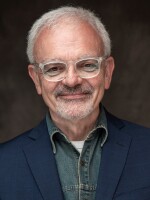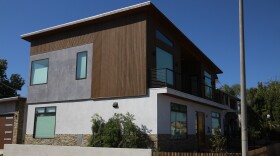MELISSA BLOCK, host:
From NPR News, this is ALL THINGS CONSIDERED. I'm Melissa Block.
MICHELE NORRIS, host:
And I'm Michele Norris.
And a word before we began our next story: it contains material that some people may find offensive.
We're going to get to that story in a moment, but first this. President Bush is halfway through what is expected to be his final European tour as president. At a news conference with Italian Prime Minister Silvio Berlusconi, President Bush talked about the need to continue to take a stand on Iran. But Iran is a major trading partner of Italy's, a sticking point between the two leaders. The president also commented on two major stories back home - the Supreme Court ruling overturning Bush administration policies for handling detainees at Guantanamo Bay and the aftermath of severe storms across the Midwest.
NPR's Don Gonyea is traveling with the president and has this report.
DON GONYEA: News from back in the States immediately overshadowed the business President Bush was conducting in Rome today. At a news conference with Italian Prime Minister Berlusconi, the first question was about today's Supreme Court ruling. The high court in a 5-4 decision rejected Bush Administration policy and ruled that foreign terrorism suspects being held at Guantanamo do have the right to go through the U.S. courts to challenge their detention. President Bush's reaction.
President GEORGE W. BUSH: First of all, it's a Supreme Court decision; we'll abide by the court's decision. That doesn't mean I have to agree with it.
GONYEA: The president said the ruling was the product of a divided court. He said he'll consider working with Congress on new legislation that he says may be needed to keep Americans safe. There was another domestic story on the president's mind as well. He used the news conference to discuss this week's devastating weather; that's included deadly tornados in Iowa as well as heavy rains and flooding in Iowa, Wisconsin, and Indiana.
Pres. BUSH: We will assist these states in any way we can to help people recover from the devastation. My thoughts and prayers are with the victims of the terrible tornados and flooding, especially those who lost loved ones.
GONYEA: Now onto the topic that's been at the top of Mr. Bush's agenda on this trip: persuading Europe to take a harder line in the effort to make sure Iran doesn't become a nuclear power.
Pres. BUSH: I told the prime minister what I said yesterday in Germany, that all officers here on the table, but the first choice, of course, is to convince the Iranians that the - that they must give up their ambitions to develop the capacity to make a nuclear weapon for the safety - for our own safety and for the sake of peace. And I'm confident we can continue to work together in a constructive way.
GONYEA: Italy's Prime Minister Berlusconi has been one of Mr. Bush's strongest supporters in Europe, but Iran is a subject where they have real differences. Italy wants a seat at the table with the six powers involve in talks in defining a resolution to the dispute with Iran. Those countries are the U.S., China, Russia, Britain, France and Germany. But several hours before the Bush-Berlusconi news conference, U.S. National Security Adviser Stephen Hadley had this blunt response when asked why Italy has not been included.
Mr. STEPHEN HADLEY (U.S. National Security Adviser): As you know, Italy has a very robust set of commercial relations with Iran. This is always a problem for countries, when their commercial ties sometimes seem to be at variance with their national security requirements.
GONYEA: Prime Minister Berlusconi responded to that. He spoke through an interpreter.
Prime Minister SILVIO BERLUSCONI (Italy): We know Iran very well from the inside. We have some leading companies that are operating in these countries. And therefore we think that this would be very useful in helping President Bush and Vladimir Putin to pursue the strategy that they've determined for that country.
GONYEA: Still, any tension over this issue does not seem to have diminished the warm relationship between Berlusconi and President Bush. At one point Berlusconi noted with pride that Mr. Bush has visited Rome more times than any other European city. And he had a suggestion for the president once he moves out of the White House - that Mr. Bush come to Rome as a visiting college professor.
Don Gonyea, NPR News, traveling with the president. Transcript provided by NPR, Copyright NPR.






